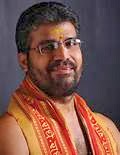The Process of Yoga : 3-6. Swami Krishnananda.
========================================================================
Sunday, January 08, 2023. 06:30.
Chapter 3: Recognising the Independent Status of Things-6.
=========================================================================
Everything in this world is independent, essentially speaking. No one is dependent on another person or thing from the ultimate point of view, but they look like dependents on account of a social relationship in which these objects or persons are entangled. Everyone asks for independence. No one wants to be dependent. No one wants to be a servant, but everyone wishes to be a boss. It is humorously said that a person went to a Guru and asked, “Maharaj, who is superior, Guru or disciple?” The Guru replied, “Guru is superior.” “Then, make me a Guru,” the person said. Likewise, humorously though, we would like to be absolutely independent in ourselves, free from all external forms of dependence, because essentially we are not related in space and in time. As space and time did not exist prior to creation, and came only afterwards, we want to assert our nature which was prior to creation because that is the ultimate reality of things.
The process of yoga, to put it in simple language, is the art of recognising the independent status of things and not submitting objects to subordination to ourselves in any manner whatsoever. Even a mouse does not want to be subordinate to us. It has its own independence. It does not want to be caught. Nothing is so low, so despicable, as to ask for, voluntarily, submission to others.
Insult is the highest punishment that we can imprecate upon a person. We may deny food, we may cut off salary, we may not sanction their leave; it does not matter. But if we insult them it is worse than anything else because their independence is affected. That is called insult. We deny the independence that the person's ego is affirming. The highest punishment that we can inflict upon a person is the denial of their ego. This ego, or the principle of self-affirmation, is a distorted form of the supreme absolute independence inherent in the Atman, or the Self of all beings.
It is from this point of view that the sage Yajnavalkya said, as recorded in the Brihadaranyaka Upanishad: na vā are sarvasya kāmaya sarvam priyam bhavati, ātmanas tu kāmāya sarvam priyam bhavati (4.5.6). All loves are Self loves. We do not love an object or a person, really speaking, because they are conditioned by the intensity of the manifestation of our Atman. All love is conditioned. We do not have unconditioned love in this world. Therefore, all satisfaction or pleasure that we derive from objects or other persons in the world are also conditioned accordingly. It is conditioned in the sense that it is determined by the extent to which our consciousness has pervaded that object.
There is a story. A poor man was crossing a river with his wife and five children. He had to vacate his house and go to some other place by crossing a stream. On his head he was carrying a trunk containing gold and other valuables, and his wife was clinging to him with their five children on her shoulders. When they were in the middle of the river, the water started rising. His wife said, “There is danger. I cannot bear the weight of these five children on my shoulders. I am going.” As they were in the middle of the river, they could neither go this way nor that way. Either way they were finished. “Throw off one child,” the man said. “Four children will do.” It is very difficult to throw a child into the water, but as it was a question of life and death she had no other alternative than to close her eyes and throw a child down.
The story goes that one by one all the children were thrown into the river, and only the man, his wife and his trunk were left. After sometime she said, “Now, even when there is no load on me, I cannot cross. My feet are giving way. I am going.” She caught hold of him tightly. He was bearing her weight and the weight of his trunk. He said, “It doesn't matter. If we are alive we can earn our bread by our sweat,” and he threw the trunk down. But the water still kept rising, and finally he began to think, “Now we are only two. What to do? If I survive, I can take another wife.” He pushed his wife into the water, and finally he alone swam across, having no thought of anything except himself. This is a crude illustration of how the selfishness of a person operates, indicating that there is something speaking from within, though in a distorted manner.












Comments